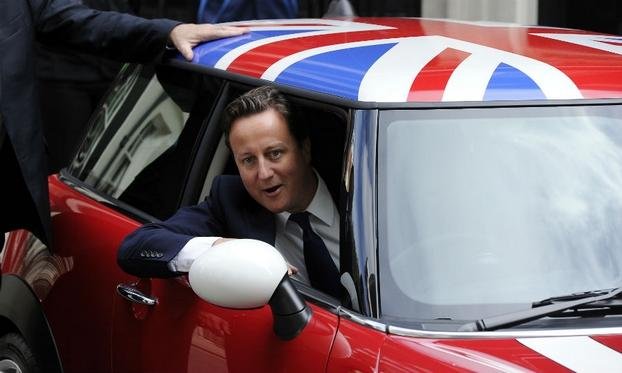German Automakers Count Cost of Possible UK Exit from EU

Prime Minister David Cameron was in Berlin today to spell out to Chancellor Angela Merkel the changes he is seeking in the UK's relationship with the EU. Cameron's visit was at the end of a four-country European tour that also included France, Poland and the Netherlands.
Merkel and the European Commission must "do everything they can to keep Britain" in the EU, said Matthias Wissmann, president of the VDA, the German auto industry lobby group.
Legislation to allow a UK referendum on the country's EU membership to take place by the end of 2017 following a renegotiation of membership terms was given priority in Cameron's government's program announced Wednesday.
The UK is Germany's most important trade partner in Europe with a surplus of 42 billion euros ($46 billion) in 2014, second only to the U.S., according to the Federal Statistics Office in Wiesbaden, Germany.
About one-fifth of all cars produced in Germany, valued at almost 18 billion euros, went to UK drivers last year, making the country the top export destination by volume for Germany's automotive industry since 2001, data from the VDA show. A UK exit may cause German car exports to the UK to contract by about 2 percent in the years to 2030, according to an April 27 study by the Bertelsmann Foundation.
"The German car industry example underlines the wholly unpredictable, risky consequences for both the British and the German economies of a Brexit," Joachim Pfeiffer, chief spokesman for economic policy for Merkel's Christian Democrat- Christian Social Union in parliament, said. "If the UK exited it would mean we've lost a large, market-orientated, liberal- and like-thinking economy in the heart of Europe."
It's not just Germany that stands to lose. While a UK exit may cause German car exports to fall, it may also mean 300 billion euros in lost economic growth by 2030 for the UK, according to Bertelsmann's findings.
BMW, Bosch fears
"It's beneficial for the UK to remain an active and influential member of the EU," said Peter Schwarzenbauer, the BMW board member responsible for the Mini and Rolls-Royce marques. "The UK plays a crucial role in the BMW Group production network and is our fourth-largest market worldwide."
The UK is home to BMW's Mini plant in Oxford and Volkswagen Group's Bentley unit in Crewe. German supplier Robert Bosch has begun to weigh the options for its business of a potential exit by the UK, which is also the fourth-biggest export destination for German machinery equipment.
"The UK is of great importance to the single market," Uwe Raschke, Bosch's head of consumer goods, said. "Should the UK decide to leave the EU, Bosch would need to study the consequences and adapt to them."
Germany exported goods and services to the UK to the tune of 84.1 billion euros last year, almost double the 42.3 billion euros in goods and services it imported from its partner, according to the statistics office.
The UK's trade surplus in financial and insurance services highlights the importance of the City of London to its economy. Deutsche Bank, a major institution in London's banking district since 1873 and an employer of 9,000 people in the UK, said it's studying the potential impact for the firm's business and is weighing options that may include relocating activities to its home country.
Related News


